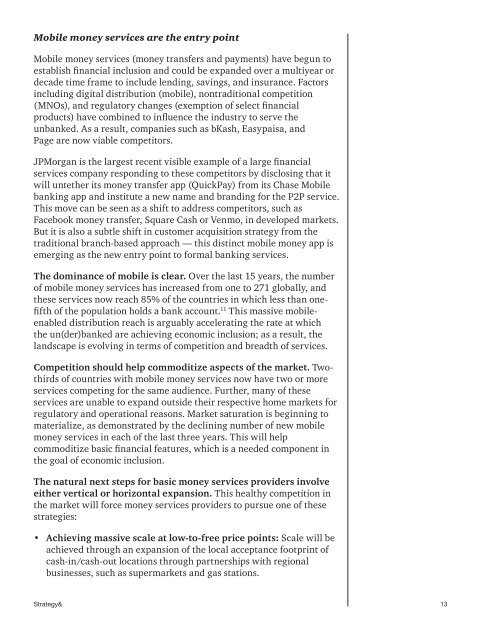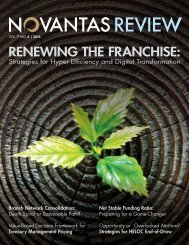The un(der)banked is FinTech’s largest opportunity
DeNovo-Quarterly-Q2-2016.pdf?utm_content=buffer9dd60&utm_medium=social&utm_source=twitter
DeNovo-Quarterly-Q2-2016.pdf?utm_content=buffer9dd60&utm_medium=social&utm_source=twitter
Create successful ePaper yourself
Turn your PDF publications into a flip-book with our unique Google optimized e-Paper software.
Mobile money services are the entry point<br />
Mobile money services (money transfers and payments) have beg<strong>un</strong> to<br />
establ<strong>is</strong>h financial inclusion and could be expanded over a multiyear or<br />
decade time frame to include lending, savings, and insurance. Factors<br />
including digital d<strong>is</strong>tribution (mobile), nontraditional competition<br />
(MNOs), and regulatory changes (exemption of select financial<br />
products) have combined to influence the industry to serve the<br />
<strong>un</strong><strong>banked</strong>. As a result, companies such as bKash, Easypa<strong>is</strong>a, and<br />
Page are now viable competitors.<br />
JPMorgan <strong>is</strong> the <strong>largest</strong> recent v<strong>is</strong>ible example of a large financial<br />
services company responding to these competitors by d<strong>is</strong>closing that it<br />
will <strong>un</strong>tether its money transfer app (QuickPay) from its Chase Mobile<br />
banking app and institute a new name and branding for the P2P service.<br />
Th<strong>is</strong> move can be seen as a shift to address competitors, such as<br />
Facebook money transfer, Square Cash or Venmo, in developed markets.<br />
But it <strong>is</strong> also a subtle shift in customer acqu<strong>is</strong>ition strategy from the<br />
traditional branch-based approach — th<strong>is</strong> d<strong>is</strong>tinct mobile money app <strong>is</strong><br />
emerging as the new entry point to formal banking services.<br />
<strong>The</strong> dominance of mobile <strong>is</strong> clear. Over the last 15 years, the number<br />
of mobile money services has increased from one to 271 globally, and<br />
these services now reach 85% of the co<strong>un</strong>tries in which less than onefifth<br />
of the population holds a bank acco<strong>un</strong>t. 11 Th<strong>is</strong> massive mobileenabled<br />
d<strong>is</strong>tribution reach <strong>is</strong> arguably accelerating the rate at which<br />
the <strong>un</strong>(<strong>der</strong>)<strong>banked</strong> are achieving economic inclusion; as a result, the<br />
landscape <strong>is</strong> evolving in terms of competition and breadth of services.<br />
Competition should help commoditize aspects of the market. Twothirds<br />
of co<strong>un</strong>tries with mobile money services now have two or more<br />
services competing for the same audience. Further, many of these<br />
services are <strong>un</strong>able to expand outside their respective home markets for<br />
regulatory and operational reasons. Market saturation <strong>is</strong> beginning to<br />
materialize, as demonstrated by the declining number of new mobile<br />
money services in each of the last three years. Th<strong>is</strong> will help<br />
commoditize basic financial features, which <strong>is</strong> a needed component in<br />
the goal of economic inclusion.<br />
<strong>The</strong> natural next steps for basic money services provi<strong>der</strong>s involve<br />
either vertical or horizontal expansion. Th<strong>is</strong> healthy competition in<br />
the market will force money services provi<strong>der</strong>s to pursue one of these<br />
strategies:<br />
• Achieving massive scale at low-to-free price points: Scale will be<br />
achieved through an expansion of the local acceptance footprint of<br />
cash-in/cash-out locations through partnerships with regional<br />
businesses, such as supermarkets and gas stations.<br />
Strategy&<br />
13




